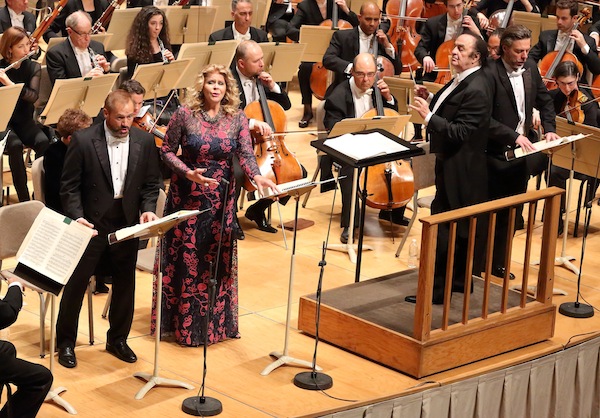BSO and all-star cast soar in Berlioz’s heavenly “Damnation of Faust”

Conductor Charles Dutoit leads the Boston Symphony Orchestra in Berlioz’s “The Damnation of Faust” with soloists Paul Groves, Susan Graham and John Relyea Thursday night. Photo: Hilary Scott
In the late 1820’s, Gérard de Nerval’s translation of Goethe’s Faust filled French bookshops and caught the eye of a young Hector Berlioz. The composer later recalled that it “fascinated me from the first. I could not put it down. I read it incessantly, at meals, in the theatre, in the street.”
Berlioz commenced setting the story to music, and his Eight Scenes from Faust was published as his Opus 1. Yet he was unsatisfied with the result, and over the next decade and a half expanded it into the work known today as The Damnation of Faust.
The work, offered by Charles Dutoit and the Boston Symphony Orchestra Thursday night at Symphony Hall, is typically atypical for Berlioz — equal parts opera, program symphony, and oratorio. The composer eventually settled on calling it a “dramatic legend.” It tells of Faust, an aged scholar who has lost the will to live. But when he meets Mephistophélès, he is transformed into a young man once again, and the two travel central Europe in search of pleasure. In a dream, Faust falls in love with Marguerite but abandons her shortly after their first meeting. When she is locked in prison and sentenced to death for the accidental murder of her mother, Faust pleads with Mephistophélès, who turns out to be the Devil, to set her free. But it costs Faust his soul, and he is led into hell while a choir of angels welcomes Marguerite into heaven.
The BSO’s concert performance of this unusual work Thursday night featured an all-star cast. Paul Groves was Faust, and he sang with a bright, sonorous tenor to capture the character’s wide emotional range. When Faust was drawn to the beauty of the outdoors, Groves’ voice swelled in lyrical phrases. His lines flickered like a candle when the character reflected upon his happier childhood. Later in the story, with Faust fixated upon Marguerite, Groves sang with distant warmth, as if still caught in the dream. And when Marguerite and Faust finally met in her chamber, he delivered melodies of sweet solace.
Mezzo-soprano Susan Graham found the charming innocence of Marguerite through a rich vocal tone that had both radiance and darkness. Her song, “The King of Thule,” glowed with a dusky light accentuated by violist Steven Ansell. Her duet with Groves flowered beautifully, and her aria in the third part of the drama had a tinge of sweet anguish.
John Relyea sang the role of Mephistophélès with robust conviction while finding the humor and seemingly good intentions of the character. But he is the Devil, after all, and when he called forth the gates of hell, Relyea’s singing took on a palpable and menacing depth.
The brief role of Brander featured one of Boston’s favorite baritones, David Kravitz, performing the jocular “Song of the Rat.”
Berlioz’s score conjures the drama’s rich imagery, and Dutoit, a longtime esteemed advocate of French music, led a lithe and dramatic reading of the score. Phrases in “The King of Thule” flowed in long arcs. “Minuet of the Will-o’-the-Wisps” bounced with nimble grace, and the scene on the banks of the Elbe glowed with a pastoral warmth. Dutoit elicited stentorian power when Faust rode into hell, the snarling brasses following the character into oblivion.
Also helping to conjure those images were the fine singers of the Tanglewood Festival Chorus. James Burton’s leadership of ensemble, which began last season, has resulted in a stronger and richer vocal blend than has been heard from the chorus in recent years. Attacks, too, were crisp and energetic. The fugal prayer that commemorates the dead rat had just the right touch of precision and seriousness to make the scene funny. And the ensemble, supported by the young singers of the Choir of St. Paul’s of Harvard Square, found the heavenly light of the drama’s conclusion. Rarely has a piece about eternal damnation ended with such delicacy.
The Damnation of Faust will be repeated 1:30 p.m. Friday and 8 p.m. Saturday at Symphony Hall. bso.org; 888-266-1200
Posted in Performances